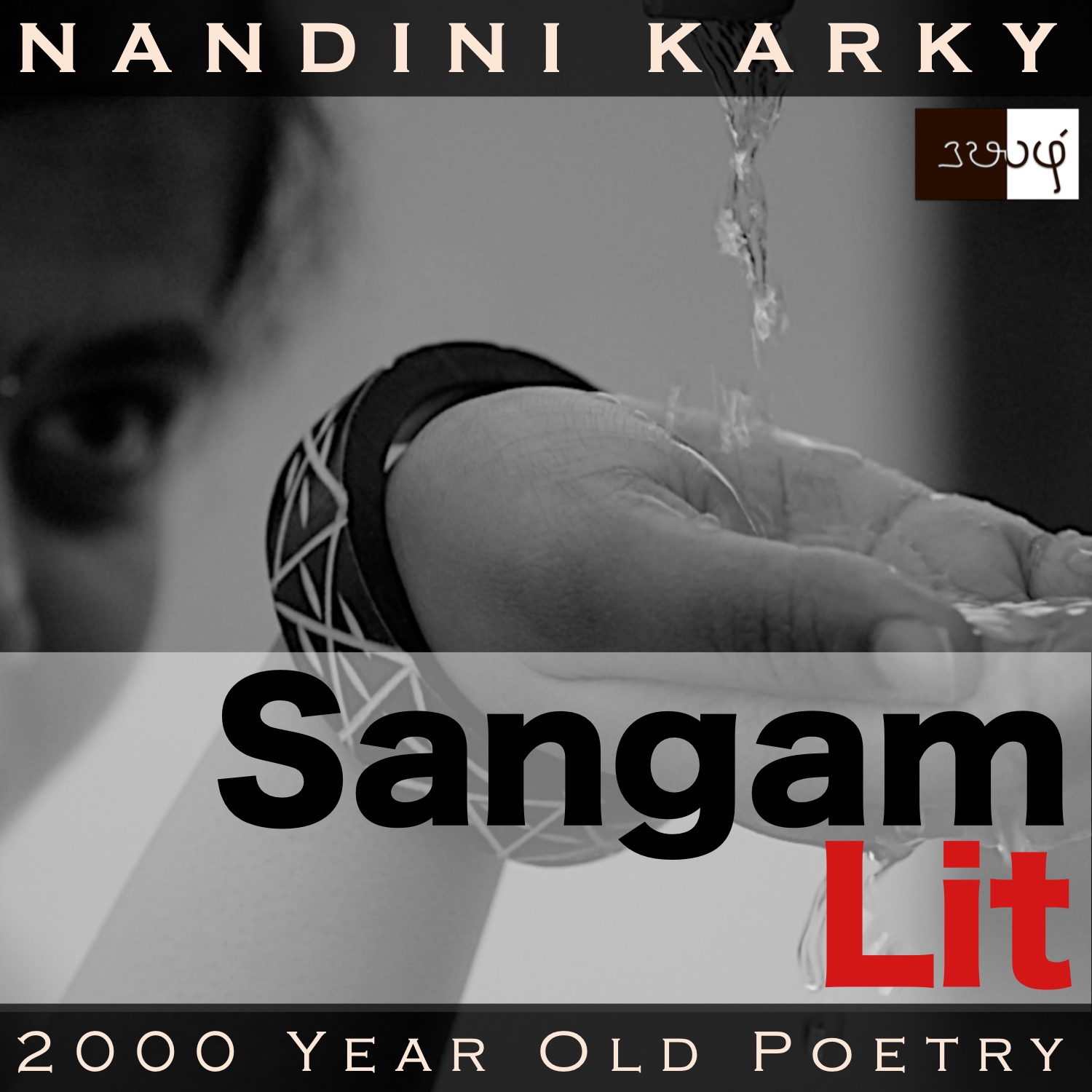Podcast: Play in new window | Download
Subscribe: Apple Podcasts | Spotify | Amazon Music | Android | iHeartRadio | Email | TuneIn | RSS | More

In this episode, we relish the rich imagery in revealing the inner world, as portrayed in Sangam Literary work, Natrinai 133, written by Natramanaar. The verse is set in the mountain country of ‘Kurinji’ and speaks in the voice of the lady to the confidante, in response to her words of consolation.
”தோளே தொடி கொட்பு ஆனா; கண்ணே
வாள் ஈர் வடியின் வடிவு இழந்தனவே;
நுதலும் பசலை பாயின்று-திதலைச்
சில் பொறி அணிந்த பல் காழ் அல்குல்
மணி ஏர் ஐம்பால் மாயோட்கு” என்று,
வெவ் வாய்ப் பெண்டிர் கவ்வை தூற்ற,
நாம் உறு துயரம் செய்யலர் என்னும்-
காமுறு தோழி!-காதல்அம் கிளவி,
இரும்பு செய் கொல்லன் வெவ் உலைத் தெளித்த
தோய் மடற் சில் நீர் போல,
நோய் மலி நெஞ்சிற்கு ஏமம் ஆம் சிறிதே.
The poem opens with ‘தோள்’ and ‘தொடி’, making any native speaker interpret the same as ‘shoulders’ and ‘bangle’ respectively. While there’s nothing amiss with seeing a bangle here, we learn that the word ‘தோள்’ used extensively in Sangam poems means not only ‘shoulders’ but the arms, entire. In other poems, I have wondered about what ‘thinning shoulders’ meant. Now, I see those in a different light. Then comes an interesting word ‘வடி’ meaning a ‘tender mango slice’. Perhaps the root of ‘வடு மாங்கா’ and the favoured Indian pickle made from it. Just nearby, smiles the word ‘வடிவு’ and I learn that this means ‘beauty’. And, I’m immediately reminded of a moment from my childhood, hearing a Sri Lankan Tamil aunty saying, ‘வடிவா இருக்குது’. While people in Tamilnadu generally use ‘அழகு’ or even ‘சுப்பர்’ today, Sri Lankan Tamils around the world still use this particular Tamil expression ‘வடிவு’ for ‘beauty’. The thick and dark hair of a Sangam woman is highlighted by the expression ‘மணி ஏர் ஐம்பால்’ meaning ‘hair tied in a five-layered braid, shining like sapphire’. Then we meet with the colourful expression ‘வெவ் வாய்ப் பெண்டிர்’ meaning ‘harsh-mouthed women’ and shortly thereafter ‘வெவ் உலை’ meaning ‘hot furnace’. When we see words like ‘காமுறு தோழி’ and ‘காதல்அம் கிளவி’ meaning ‘endearing friend’ and ‘words filled with love’, we perceive that words like ‘காமம்’ and ‘காதல்’ are not employed in the narrow meaning of ‘romantic love’, as is the case today. Let’s travel to that yesterday to see the meaning, entire.
The man and woman have been in a love relationship and the man parts to gather wealth for their wedding. The lady suffers during that period of separation and her friend tries to cheer her up. The lady replies to her confidante saying,“O adorable friend! You say, he will never cause me the pain of hearing those fiery-mouthed townswomen spread slander and say, ’Changes now appear on that dark-skinned girl with flowing, sapphire-hued tresses, tied in a five-layered braid; the one wearing many strings of precious gems around her waist, decked with speckles. Her bangles are slipping away from her arms; Her eyes, which used to have the lustre of a tender mango sliced by a sword, have lost their beauty; The affliction of pining spreads on her forehead.’ Like how the blacksmith forging iron dips a palm leaf in water and splashes a few drops to cool his furnace, your words, filled with love, shower some calm on my heart filled with this pain of parting.” With these words, the lady expresses how she’s appeased, a little, by the consoling words of the confidante.
Gazing deeper at the heart of this lady, we unravel the nuances hidden there. As in the case of a gripping novel or a short story, the verse opens with a dialogue. We hear someone saying, ‘O, her bangles are slipping! Her eyes that used to shine like a tender mango cut with a sword have lost their lustre! Her forehead seems wreathed in the disease of pining!’ Then, we realise these are not the words of one but many hot-mouthed women, of that village. We need to take a step back from the flow and admire a new expression in the rendition above. I would like to recall the image of an unripe mango, cut by a sword. That sharp cut will reveal a shiny white interior, full of moisture. This image is compared to the erstwhile shiny eyes of the lady. In many other poems, we’ve seen the lady’s eyes compared to flowers many. But this mango reference feels a kind of lip-smacking delicious! Returning to the words of the verse, we find the dialogue vanishing into thin air. This is because the lady reveals that according to the confidante, the man will not let such a thing happen. Before those women start gossiping and spreading rumours, the man would keep his word and be back to seek the lady’s hand in marriage. The lady then rightly so, refers to these words of cheer as ‘words filled to the brim with love’!
Another exquisite image is brought forth before our eyes. There’s a blacksmith forging iron in his smithy. There’s heat everywhere. He then dips a palm leaf in water and splashes the same on his furnace. Amidst all that raging heat, can that even make a difference? It does and cools the furnace, a little. This exacting image is placed in parallel to the words of the confidante. Her words are said to be like those little drops of water, little soldiers trying to quell the giant called slander in the town. Those words , in an attempt to nullify the hot, burning words of the gossiping townswomen, do bring a cool solace to the lady. A moment that tells us to never underestimate the power of a kind word in bringing calm to a burning heart!




Share your thoughts...